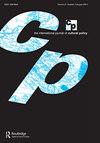Inviting all humanity to an elite club? Understanding tensions in UNESCO’s global heritage regimes through the lens of a typology of goods
IF 1.6
3区 社会学
Q2 CULTURAL STUDIES
引用次数: 1
Abstract
ABSTRACT This paper aims to reflect on heritage diplomacy by analysing the nature of tensions in Global Heritage Regimes (GHRs) built around the World Heritage Convention and the Intangible Heritage Convention. Combining regime theory with Ostroms’ typology of goods, we claim that the process of transforming the abstract idea of ‘Heritage of Humanity’ (HoH) into an outcome in the form of a heritage list needs to mobilise heritage as diplomacy and also is the result of heritage as diplomacy. At the same time, the transformation generates tension based on the experienced delusion of (1) the expectations built upon the inclusive idea of the ‘Heritage of Humanity’ (public good) and (2) the exclusive character of heritage lists (club goods). We claim that this ‘Inclusion-Exclusion Tension’ (IET) is an inherent element of global heritage regime design and as such needs to be managed through diplomatic efforts.邀请全人类参加精英俱乐部?从商品类型学的角度理解联合国教科文组织全球遗产制度中的紧张关系
本文旨在通过分析围绕《世界遗产公约》和《非物质遗产公约》建立的全球遗产制度(ghr)的紧张性质,反思遗产外交。将制度理论与ostrom的商品类型学相结合,我们声称将“人类遗产”(HoH)的抽象概念转化为遗产清单形式的结果的过程需要动员遗产作为外交,同时也是遗产作为外交的结果。与此同时,这种转变产生了一种张力,这种张力是基于(1)建立在“人类遗产”(公共物品)的包容性理念上的期望和(2)遗产清单(俱乐部物品)的排他性的错觉。我们认为,这种“包容-排斥张力”(IET)是全球遗产制度设计的内在因素,因此需要通过外交努力加以管理。
本文章由计算机程序翻译,如有差异,请以英文原文为准。
求助全文
约1分钟内获得全文
求助全文

 求助内容:
求助内容: 应助结果提醒方式:
应助结果提醒方式:


